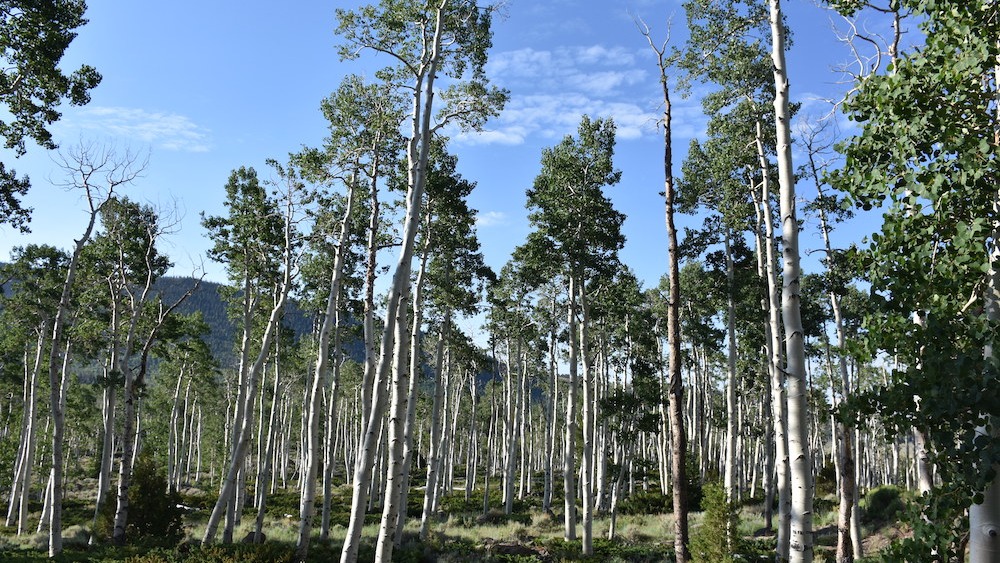Listen to the sounds of Pando, the largest living tree in the world
Researchers are using sound to study Pando, the world's largest tree.

Researchers have recorded the sounds of the world's largest tree, a 13-million-pound (6 million kilograms) behemoth known as Pando that stretches across 106 acres (43 hectares) in southern Utah. The researchers think that listening to the recordings could give them a better understanding of the sprawling aspen’s health and any environmental changes that might affect it.
To the untrained eye, Pando resembles a forest made up of quaking aspen (Populus tremuloides) trees. However, it's actually a single clone comprising approximately 40,000 genetically identical stems (trunks) that are interconnected by a complex root system.
Last summer, Jeff Rice, a Seattle-based audio engineer, traveled to Pando, whose name means "I spread" in Latin. Using a hydrophone (a microphone normally used to pick up sounds underwater), he began recording the rustling of Pando's leaves in the wind, birds chirping in the canopy and critters scampering around — but he soon wanted to hear what was going on underground.
"There is this beautiful interconnectedness of Pando itself," Rice, who presented his recordings on May 10 at the 184th Meeting of the Acoustical Society of America, told Live Science. "Its sounds are so many different elements, but there's also this rich underground soundscape. There's more than just the trembling of the leaves. I started to discover that there was a lot going on there."
Rice teamed up with Lance Oditt, founder and executive director of Friends of Pando, a nonprofit organization dedicated to education and research about Pando. Working with Rice, who last summer served as its artist in residence, they began recording beneath the forest floor by dropping the hydrophone into what they dubbed the "Pando portal" — a gaping hole in one of the tree trunks. The result was a low, percussive rumbling similar to a guttural groan.
"I could reach down into the hole and connect the hydrophone directly to the roots," Rice said. "I plugged it in almost like a plug into a socket. We immediately started hearing interesting sounds, but what really stood out was a low, drone-like sound."
Related: The oldest tree in the world (and the 7 runner-ups)
Sign up for the Live Science daily newsletter now
Get the world’s most fascinating discoveries delivered straight to your inbox.
To test their theory that the sound they were hearing was being carried via Pando's roots, they knocked on a branch roughly 100 feet (30 meters) away from the portal. The hydrophone recorded it as a thud.
"We could clearly hear the tapping," Oditt told Live Science. "This helps demonstrate that Pando is interconnected — and not just at the soil level. The root system is like a latticework underground."
Oditt is hopeful that getting a clearer image of what's rumbling beneath the surface could help scientists gain a better understanding of Pando, which is considered one of the largest organisms in the world.
For the past several summers, Oditt and a team of volunteers have been meticulously photographing nearly every square inch of the aspen clone using 360-degree cameras. Called the Pando Photographic Survey, the major undertaking enables anyone with an internet connection to virtually explore Pando. The project serves as a baseline to monitor changes to the tree over time.
The underground recordings offer new opportunities to better understand what has come to be known as the "trembling giant" in a way that's completely noninvasive. This includes mapping out Pando's root system, monitoring water flow and performing wildlife management that may help deter deer from eating the tree, which could hinder its regeneration.
"We can listen to any changes to the water and soil happening underground, and also use sound to trace its root system," Oditt said. "We could also possibly track disease and release ultrasonic sounds to help with the deer problem. We're not turning Pando into a speaker, but we want to help the tree to ward off problems."
Jennifer Nalewicki is former Live Science staff writer and Salt Lake City-based journalist whose work has been featured in The New York Times, Smithsonian Magazine, Scientific American, Popular Mechanics and more. She covers several science topics from planet Earth to paleontology and archaeology to health and culture. Prior to freelancing, Jennifer held an Editor role at Time Inc. Jennifer has a bachelor's degree in Journalism from The University of Texas at Austin.










